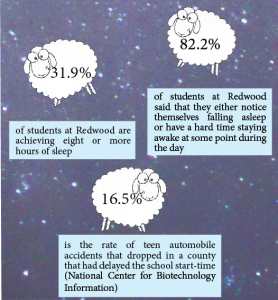After a full day of school and extracurriculars, it can seem almost impossible to squeeze in homework and enough sleep with so few hours in the day. Yet research shows that by not getting those nine to ten hours of shut-eye, our mental and physical health is put at serious risk.
“Sleep is highly important to our ability to function,” said Stanford University sleep medicine fellow Michelle Jonelis, MD. “If you sleep deprive animals for long enough, they will invariably die. It’s a little bit unclear why, but their immune system shuts down.”

Sleep is essential to the ability to concentrate, consolidate memories, regulate mood, and control impulsivity, according to Jonelis. A lack of sleep can lead to a greater chance of sickness, depression, bipolar disorder, and poor decision-making.
The Centers for Disease Control (CDC) recommend that teens sleep for nine to ten hours each night—yet only 31.9 percent of students at Redwood are achieving eight or more hours of sleep, according to a recent Bark survey.
Of the students with a first period class, 82.2 percent said that they either notice themselves falling asleep or have a hard time staying awake at some point during the day.
“Basically, your performance and ability to pay attention continues to worsen the longer you’re sleep deprived–your memory, your ability to make good decisions, your ability to multitask,” Jonelis said, adding that physical reflexes can be impacted by deficits in sleep.
Redwood students are not alone in their habits of sleep deprivation, as national data follows a similar trend. Across the country, only 31.4 percent of high school students get at least eight hours of sleep a night, according to 2011 data from the U.S. Department of Health and Human Services. In fact, the problems resulting from too little sleep are so significant and widespread that the CDC has deemed insufficient sleep a public health epidemic.
Some conditions associated with insufficient sleep include increased risk of obesity, diabetes and impaired glucose tolerance, cardiovascular disease and hypertension, anxiety, depressed mood, and alcohol use, according to the National Center of Biotechnology.
“It’s time to stop looking at this as something that affects a small subset of the population–clearly getting proper sleep and having enough sleep is something that’s as important as making sure your immunizations are up to date, as wearing a seat belt, as not smoking, as taking your medications as prescribed,” said Cora Breuner MD, MPH, professor of Adolescent Medicine at the University of Washington.
Breuner said that often people cannot notice their own cognitive impairment when they are sleep-deprived.
“Trying to argue with someone about the negative effects of not getting enough sleep when they haven’t gotten enough sleep is pretty hard,” Breuner said. “A lot of kids will respond back, ‘I’m fine, I can just drink coffee and catch up on the weekends. It’s really interesting to realize that when you talk to a kid when they’re in a pretty sleep-deprived state, it’s hard [for the kid] to understand how much better they would feel if they got enough sleep.”
If sleep is so important, why can’t teens get enough of it? Numerous factors contribute to the challenge, though one major contributor is the natural biological shift toward a later bedtime during adolescence. The tendencies of teens to go to bed later and wake up later make it hard to fall asleep before 11 p.m. due to a shift in circadian rhythms, or biological clock, during the teenage years.
Jonelis suggested one possible explanation for this natural delay, which is that in Paleolithic times, teens took the night shift in watching out for their tribe to ensure that at least one person was on watch at all hours of the day.
Also playing a role in the widespread lack of sleep are the busy schedules of students, which are often packed with sports, internships, homework, and other extracurricular activities.
“Teen sleep is really important for academic performance, for athletic performance, for mood, but I also know that even at Redwood, there’s a zero period because there’re so many things that students want to do,” said Wellness Director Jessica Colvin.
Along with extracurricular activities, heavy use of technology is a major contributor to sleep loss.
“People under appreciate the effect of technology–bright TV, bright lights on in the house, smartphone, computers–all of that stuff does delay our natural bedtime,” Jonelis said.
A study published in the Journal of Clinical Sleep Medicine showed that when adults were placed in Stone Age-like conditions – without electricity, mobile phones, and bright screens – the average sleep time for the adults increased by about 1.8 hours per night.
















